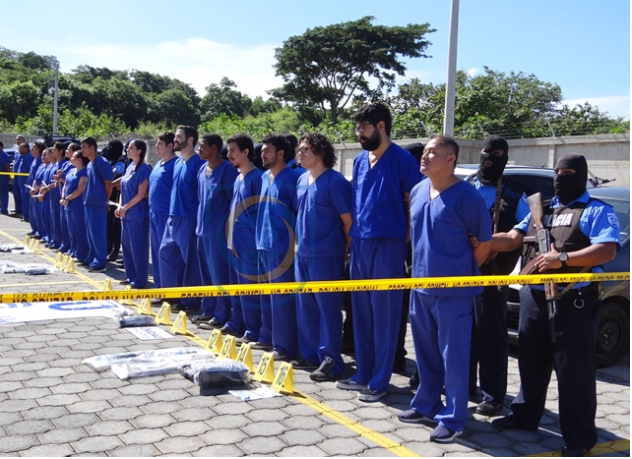Thirteen Nicaraguan activists face judicial proceedings aimed at criminalizing an act of solidarity
Washington D.C. November 19, 2019. Four days after being arbitrarily detained in the city of Masaya, a group of thirteen human rights defenders and activists were charged by the Nicaraguan […]

Washington D.C. November 19, 2019. Four days after being arbitrarily detained in the city of Masaya, a group of thirteen human rights defenders and activists were charged by the Nicaraguan Public Prosecutor’s Office with illicit arms trafficking, and were taken to a court hearing before the deputy judge Cruz Adalberto Zeledón in the capital city of Managua on Monday.
The activists were arrested last Thursday night (November 14th) as they were traveling in a 4-vehicle caravan to the San Miguel Arcángel Church, with the goal of providing water and medicine to a group of political prisoners’ mothers who are on a hunger strike demanding the immediate release of their children.
The detainees are part of the Blue and White National Union (UNAB, for its initials in Spanish), a grouping of social movements, civil society organizations, activists, human rights defenders, students, and organized citizens that demands the Ortega-Murillo government leave power through democratic means.
The names of the 13 prisoners are: Ivannia Álvarez Martínez, Amaya Coppens Zamora, Neyma Hernández Ruiz, Jesús Tefel Amador, José Medina Cabrera, Atahualpa Quintero Morán, Wendy Avilés Juárez, Olga Valle López, Roberto Buchting Miranda, Hansel Quintero Gómez, María Hurtado Chamorro, Melvin Peralta Centeno and Derlis Hernández Flores.
Three other persons, who according to their relatives were arrested on different dates, were also prosecuted in the same case: Jordan Lanzas Herrera, Marvin López Ñamendiz and Wilfredo Brenes Domínguez.
Detention
One of the activists recorded the arrest, conducted by several cars full of police, in a Facebook Live video: first, the police officers blocked their path, then approached them to request their identification and the vehicle’s documentation. Without being told why, the activists were then told to proceed to the police station in Masaya.
However, the accusation presented by the Nicaraguan Public Prosecutor’s Office gives another version of the story. It says that during the police stop, “the aforementioned reacted violently, disturbing the order and peace in the area, thus obstructing the police work.” On Monday, the second-in-command of the Directorate of Judicial Assistance, Victoriano Ruiz, said that police found twelve Molotov bombs, three revolvers, four smaller firearms, and a shotgun in the vehicles, which the group of activists allegedly intended to use in attacks on Masaya, Managua, and Chinandega.
“This is one more act of the great circus that this regime is running in Nicaragua. They could not find anything else to invent. Imagine the fear they have about a group of young people carrying water to a church, a humanitarian act, that they have to accuse them with tremendous nonsense,” said Mario Hurtado, brother of María Hurtado, to the media outlet Confidencial.
The detainees were not arrested in flagrante nor did the authorities have an arrest warrant for them. The 48-hour deadline for presenting detainees before the judge was ignored, and the activists were not allowed to communicate with their lawyers before being taken to the hearing. Furthermore, their families were not notified of the detention, and neither they nor their families were told the crimes for which they were arrested.
Inhuman Treatments
On the contrary, the detainees told their defense lawyers -whom they met during the court hearing- that they had been beaten in the police station and that three members of the group had been taken to punishment cells, which lack sunlight and ventilation.
On Tuesday, Maynor Curtis, the defense lawyer for the 25-year-old Belgian-Nicaraguan Amaya Coppens, reported that Amaya was detained in a punishment cell. According to Curtis, the officers did not give Coppens the asthma and blood pressure medication that her parents had brought her. As a consequence, she had health problems on the night of Friday, November 15, and should have been taken urgently to the medical post within the jail.
It is expected that the judicial process, admitted by Judge Zeledón of the fifth district criminal court, will resume on November 28th.
Statement
Race and Equality condemns these actions that criminalize acts of solidarity and violate the right to defend the human rights of freedom of mobilization and peaceful demonstration. In different international forums, we have exposed the deep deterioration of judicial independence in Nicaragua and how the Nicaraguan judiciary was brought into the government’s scheme to violate human rights. We regret that prosecution for unfounded crimes persists as a repressive mechanism, having been used against more than 400 people during the past year by the Nicaraguan State, violating detainees’ rights to due process and minimum guarantees.
We demand that the State of Nicaragua immediately release the more than 150 political prisoners it holds, definitively dismiss the investigations and judicial cases against them, expunge their criminal records, and return their property confiscated at the time of the detention. The state must guarantee reparation for human rights violations and for the social, moral, and material damages these prisoners have suffered, as well as those suffered by all those who were arbitrarily detained and prosecuted after the events of April 2018.

